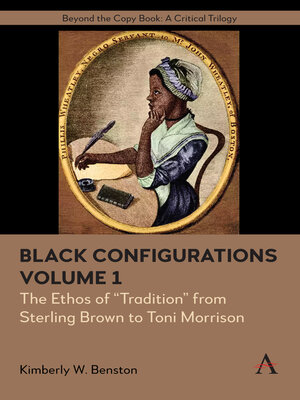Black Configurations
ebook ∣ The Ethos of "Tradition" from Sterling Brown to Toni Morrison, Volume I · Anthem Africology Series
By Kimberly W. Benston

Sign up to save your library
With an OverDrive account, you can save your favorite libraries for at-a-glance information about availability. Find out more about OverDrive accounts.
Find this title in Libby, the library reading app by OverDrive.



Search for a digital library with this title
Title found at these libraries:
| Library Name | Distance |
|---|---|
| Loading... |
Black Configurations is the first volume of a three-volume study that offers a fresh reading of African-American literary history by locating within the literature itself the terms for a revisionary account of black writing, terms pursued along three distinct but interlocking pathways: by charting figurations of tradition among six of the most innovative practitioners of black literary expression from Sterling Brown to Toni Morrison (Volume 1); by following the haunting pathways of spectral dialogues between slavery and African-American modernism (Volume 2); and by interrogating interlocking topoi of critique and assertion (naming; facing; voicing) across the history of African-American literary expression. The critical trilogy thereby presents a narrative of African-American literature as a continual, dialectical process, blending confrontation with traumatic origins and the quest for expressive transformation. This project arises from the question: how does one construe and narrate the story of a tradition for which the conventional structure of literary history is itself politically and thematically charged issue? Across the landscapes cultivated by each of its three volumes, the study confronts this question by developing a mode of critical history adequate to a literature that exerts transformative pressure on the very experience that engenders it, attending both to the material circumstances of its linguistic achievement and the expressive activity by which the black subject emerges.
|Black Configurations is the first volume of a three-volume study that offers a fresh reading of African-American literary history by locating within the literature itself the terms for a revisionary account of black writing, terms pursued along three distinct but interlocking pathways (each to be pursued in the Impact Series format): by charting figurations of tradition among six of the most innovative practitioners of black literary expression from Sterling Brown to Toni Morrison (Volume 1); by following the haunting pathways of spectral dialogues between slavery and African-American modernism (Volume 2); and by interrogating interlocking topoi of critique and assertion (naming; facing; voicing) across the history of African-American literary expression (Volume 3). The critical trilogy presents thereby a narrative of African-American literature as a continual, dialectical process, blending confrontation with traumatic origins and the quest for expressive transformation.
This project arises from the question: how does one construe and narrate the story of a tradition for which the conventional structure of literary history—that is, the relation between discourse and its referents—is itself such a politically and thematically charged issue? On one hand, the ideological exclusion of the African-American subject from authorized spheres of meaning and signification gives value to narrating black literary tradition as the progressive emergence of a fully articulate presence, and seems to find warrant in black writing's persistent thematization of literacy, public performance, and self-definition. On the other hand, such a narrative of fully realized agency and consciousness risks replicating the dominant ideology's own reductive vision of identity as a predetermined totality, thus imagining some singular and final form for African-American being. The study asserts instead that African-American literature is fueled by the simultaneous workings of a desire for a totally realized subject and the constant displacement of that desire by a willingness—in contrast to the oppressive system that would deny its agency—to put its own mode of being into...







